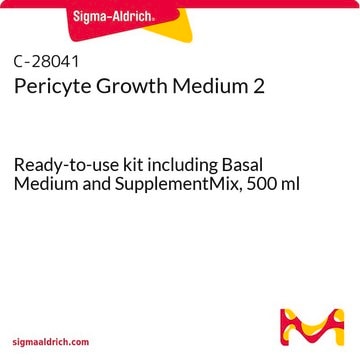821-500
Astrocyte Growth Medium (500 ml)
Synonym(s):
Astrocyte Medium
Sign Into View Organizational & Contract Pricing
All Photos(1)
About This Item
UNSPSC Code:
12352207
NACRES:
NA.71
Recommended Products
form
liquid
shelf life
6 mo.
manufacturer/tradename
Cell Applications, Inc
shipped in
wet ice
storage temp.
2-8°C
General description
Astrocyte growth medium is an all-in-one ready-to-use media, which is optimized for the characteristics and requirements unique to human astrocytes.
Application
Astrocyte growth medium (500 ml) has been used to culture and maintain normal human astrocytes.
Quality
Each lot was tested for the ability to support plating, spreading and proliferation
Preparation Note
contained in protocol
Storage Class Code
12 - Non Combustible Liquids
WGK
WGK 1
Flash Point(F)
Not applicable
Flash Point(C)
Not applicable
Certificates of Analysis (COA)
Search for Certificates of Analysis (COA) by entering the products Lot/Batch Number. Lot and Batch Numbers can be found on a product’s label following the words ‘Lot’ or ‘Batch’.
Already Own This Product?
Find documentation for the products that you have recently purchased in the Document Library.
Yi-Ting Lin et al.
Journal of clinical medicine, 8(2) (2019-02-16)
Uremic toxins accumulated in chronic kidney disease (CKD) increases the risk of cognitive impairment. Indoxyl sulfate (IS) is a well-known protein-bound uremic toxin that is correlated with several systemic diseases, but no studies on human brain cells are available. We
Jiaxin Sun et al.
Scientific reports, 10(1), 13899-13899 (2020-08-19)
Metabolic reprogramming in cancer cells, vs. non-cancer cells, elevates levels of reactive oxygen species (ROS) leading to higher oxidative stress. The elevated ROS levels suggest a vulnerability to excess prooxidant loads leading to selective cell death, a therapeutically exploitable difference.
Iris Maria Forte et al.
International journal of oncology, 54(6), 2189-2199 (2019-05-14)
Glioblastoma (GB) is the most common and aggressive malignant tumor of the central nervous system. Despite current intensive treatment regimens, consisting of surgical resection followed by radiotherapy with concomitant and adjuvant temozolomide (TMZ) chemotherapy, the prognosis of patients with GB remains
Our team of scientists has experience in all areas of research including Life Science, Material Science, Chemical Synthesis, Chromatography, Analytical and many others.
Contact Technical Service





